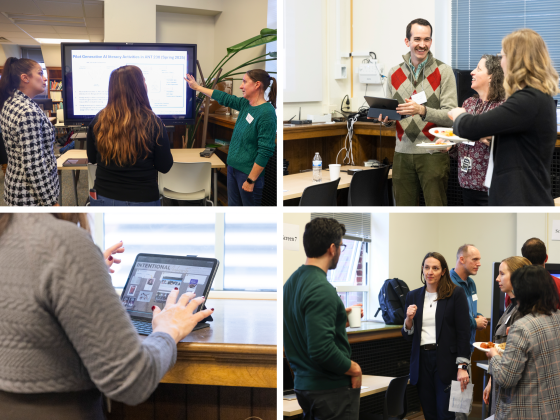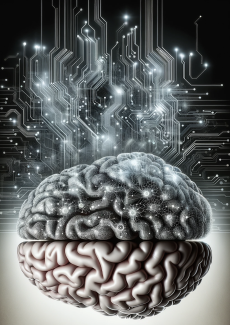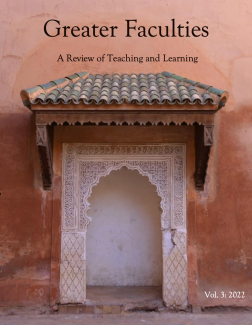
Teaching Innovation Institute Exploring AI in Education
CELT's Teaching Innovation Institute is a responsive, interdisciplinary learning community that addresses emergent issues in higher education. The Institute brings transdisciplinary faculty cohorts into conversation and collaboration to address opportunities and challenges in higher education.
Beginning in 2024, the Institute was rebooted to focus on generative AI in education. Participants develop critical AI literacies in technical, ethical, practical, and disciplinary areas. The Institute is open to full-time faculty with regular teaching responsibilities.
participants since 2020
& 58 depts/schools represented among faculty participants
since the Institute's launch in 2020
2024-2025 TII Cohort to Focus on Generative AI
The fifth cohort of the CELT Teaching Innovation Institute—its largest yet—will focus generative artificial intelligence (AI) in teaching, learning and higher education. We now consider a widening spectrum of generative AI technologies that are increasingly integrated into software suites and other digital tools. They have become much more sophisticated while many limitations and concerns persist. The discourse on generative AI is energetic but also challenging for its mix of speculation and specialized knowledge, as well as a range of competing goals and agendas.
Since January 2023, CELT has hosted trainings, workshops, presentations, and other events on AI in teaching and learning (200 as of December 2025). We continue to consult individually with instructors, staff and students on the technical, ethical and rhetorical dimensions of this emergent and disruptive technology both at a high level as well as in specific disciplinary contexts. And, we anticipate the launch of a proposed badge program on AI in teaching and learning for the Spring 2026 semester.
We are excited to announce the 2024-25 Teaching Innovation Institute faculty and look forward to learning alongside them as our leadership and support for generative AI in higher education evolves along with the technologies themselves.

2020 TII Cohort Featured in "Greater Faculties"
This issue of CELT's Greater Faculties: A Review of Teaching and Learning features a series of 'flash essays' written by 2020 Teaching Innovation Institute faculty participants to document their experiences and to share their innovations. The essays are organized into four sections. The first, “Digital Assignments for Real-World Application,” centers on the idea of using digital technologies to facilitate assignments that require students to apply their content knowledge to real-world problems. The second section, “Increasing Access and Interaction,” explores instructional additions that sought to increase student access to challenging or complex concepts. Section three, “Cloud-based Applications for Collaborative Learning,” offers suggestions for facilitating small group assignments, feedback exchange, conversations, and brainstorming. The fourth section, “Instruction in Different Modalities,” takes a broader view of teaching during uncertain times and examines the state of teaching in increasingly digital and augmented learning environments. View the issue here.

Teaching Innovation Institute Cohorts
2025-26
- Christal Badour, Psychology
- Jessica Barfield, Information Science
- Jordan Brown, Sociology
- Jeff Cain, Pharmacy Practice & Science
- Ming-Yuan Chih, Health & Clinical Sciences
- Frances Henderson, Gender & Women's Studies
- Lou Hirsch, Plant Pathology
- Laura Manning, Modern & Classical Languages, Literatures, & Cultures
- Katie Mullen, Arts Administration
- Thamer Musbah, Oral Diagnosis, Oral Medicine, & Oral Radiology
- Erin Richard, Biology
- Savannah Robin, Agriculture, Food, & Environment
- Joanne Rojas, Educational, School, & Counseling Psychology
- Ashley Samson, Kinesiology & Health Promotion
- Lina Sharab, Orthodontics
2024-25
- Kristie Bartlett, Product Design
- Kari Benguria, Information Science
- Roger Brown, Agricultural Economics
- Thom Cochell, Chemical & Materials Engineering
- Emily DeWitt, Dietetics & Human Nutrition
- Juan Fernandez Cantero, Hispanic Studies
- Abigail Firey, History
- Adriane Grumbien, Integrated Strategic Communication
- Jason Hans, Family Sciences
- Whitney Hanley, Early Childhood, Special Education, & Counselor Education
- April Hatcher, Neuroscience
- Jane Jensen, Educational Policy Studies and Evaluation
- Yeonjung Kang, Retailing and Tourism Management
- Patrick Lee Lucas, Interiors
- Joe Martin, Information Science
- Pratishtha Mishra, Oral Health Practice
- Michael Pennell, Writing, Rhetoric, & Digital Studies
- Darshak Patel, Economics
- Winter Phong, Arts Administration
- Kristel Scoresby, Social Work
- Pooja Sidney, Psychology
- Alice Turkington, Geography
- Kristine Urschel, Animal & Food Science
- Heather Worne, Anthropology
- Ozge Yalciner, Curriculum & Instruction
2023-24
- Kim Anderson, Chemical & Materials Engineering
- Marc Cormier, Kinesiology & Health Promotion
- Shannon Crawford Barniskis, Information Science
- Crystal Felima, Anthropology
- Tonja Fisher, Entomology
- Nathan Haan, Entomology
- Anastasia Hauser, Chemical & Materials Engineering
- Hayley Hoffman, Information Science
- Mengtian Jiang, Integrated Strategic Communication
- Seth Jones, Biology
- Jayoung Koo, Landscape Architecture
- Alissa Rossi, Community & Leadership Development
- Eric Sanday, Philosophy
- Nazmus Sakib, Lewis Honors
- Jack Schieffer, Agricultural Economics
- Carol Street, Special Collections
- Anastasia Todd, Gender & Women’s Studies
- Koji Tanno, Modern & Classical Languages, Literatures & Cultures
- Helen Turner, Interiors
- Ashley Vowels, Health & Clinical Sciences
- Sarah Wackerbarth, Health Management & Policy
2022-23
- Stefan Bird-Pollan, Philosophy
- Eladio Bobadilla, History
- Renee Bonzani, Anthropology
- Anna Bosch, Linguistics
- Nicole Breazeale, Community & Leadership Development
- Brenna Byrd, Modern & Classical Languages, Literatures, & Cultures
- Thom Cochell, Chemical & Materials Engineering
- Sarah Cprek, Health, Behavior, & Society
- Brad Elliott, Mathamatics
- April Hatcher, Neuroscience
- Kettrell McWhorter, Epidemiology
- Zitsi Mirakhur, Educational Policy Studies & Evaluation
- Kathryn Mullen, Arts Administration
- Thamer Musbah, Oral Health Practice
- Denise O'Dell, Physical Therapy
- Erin Richard, Biology
- Elizabeth Spencer, Integrated Strategic Communication
- Kristine Urschel, Animal & Food Sciences
- Jessalyn Vallade, Information Science
2021-22
- Ruth Brown, Hispanic Studies
- Diana Byrne, Civil Engineering
- Julian Dupuis, Entomology
- Amanda Ellis, Biostatistics
- Heather Erwin, Kinesiology & Health Promotion
- Lindsey Fay, Interiors
- Jane Grise, Law
- Regina Hannemann, Electrical & Computer Engineering
- Kyra Hunting, Journalism & Media Studies
- Aaron Hynds, Music
- Anushka Karkelanova, Statistics
- Darshak Patel, Economics
- Katherine Paullin, Mathematics
- Kristen Platt, Neuroscience
- Kathy Swan, Curriculum & Instruction
- Mark Swanson, Health, Behavior, & Society
- Katie Twist, Internal Medicine
- Cheryl Vanderford, Physician Assistant Studies
- Elizabeth Williams, Gender & Women's Studies
- Jessica Wilson, Nursing
- Heather Worne, Anthropology
2020
- Christy Brady, Clinical Leadership & Management
- Andrew Byrd, Linguistics
- Heather Campbell-Speltz, Hispanic Studies
- Blanche Cook, Law
- Jennifer Cowley, Nursing
- Emily Croteau, Biology
- Laura Fischer, Integrated Strategic Communication
- Frances Henderson, Gender & Women's Studies
- Lou Hirsch, Plant Pathology
- Gail Hoyt, Economics
- Christopher Huggins, Sociology
- Nancy Jones, Theatre and Dance
- Lee Ann Paynter, Art & Visual Studies
- Sara Police, Pharmacology & Nutritional Sciences
- Nels "Jeff" Rogers, Modern & Classical Languages, Literatures, & Cultures
- Allison Soult, Chemistry
- Farzad Taghaddosi, Mechanical & Aerospace Engineering
- Ellen Usher, Educational, School, & Counseling Psychology
- Sarah Vos, Health Management & Policy
- Jackie Wahrmund, Animal & Food Sciences